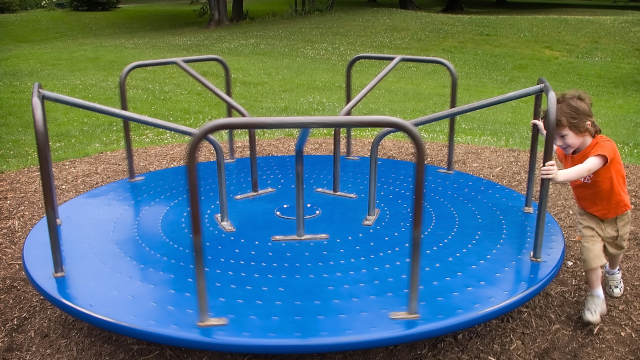Directly involved with 9,000 to 10,000 termination meetings, Karl explains how burnout was a factor in many of them.
It Will Be OK
It sounds like a cliché. It’s something you say to someone when you don’t know what else to say or how to really empathize with their sorrow. When you’re struggling with burnout, you might wonder how they know it will be OK, if they know it will be OK, or if they’re just being polite. Ultimately, you discount what they say – but, strictly speaking, they’re right.
Defining OK
The key problem is in the definition of what it means to be OK. We often want to have free time. We want to feel like we’re making a difference. The problem is we don’t always feel that way. We see change coming – for better or for worse – and we can’t see how things will be OK. We can’t imagine what that’s like.
Consider the newly injured paraplegic who hears “it will be OK” and wonders how it could possibly be OK. How could anything possibly be OK ever again? Fast forward a few months and you’ll find that most (if maybe not all) have adapted to a new normal, a new way that their life works. It’s not the same. It’s very different, but at the same time, it’s OK.
When we say that things will be OK, we don’t mean that things will be the same. We mean you’ll survive and find ways to be happy, even if they’re new ways.
Not the Same
In fact, the idea that what is to come is not the same is a source of hope. If you’re struggling with burnout now, then more of the same would surely lead you further into the grips of burnout. So, change is a good thing. On the one hand, we like the security of the things we know. On the other, we struggle to believe that things won’t get better.
So, when you think about the future, it’s certain that it won’t be the same. As the Greek philosopher Heraclitus once noted, “No man ever steps in the same river twice, for it’s not the same river, and he’s not the same man.” The fact that things are constantly changing gives us hope that we’ll find a way that allows us to feel like we’re more productive. Our goals may be changed or scaled back – but, ultimately, they won’t be the same.
Goal Changes
A part of building burnout resistance is knowing when – and how – to adapt your goals, to change them in ways that are still amazing and will have the kind of impact that you want for the world but are more reasonable than where you started. It’s certainly possible to desire to be an astronaut. However, the number of astronaut jobs are very limited. Perhaps, if you lose out on that one position you really wanted, you can consider how you can bring your passion for space to the next generation of children. Bill Nye, known as Bill Nye the Science Guy, wanted to be a comedian but connected with his love for science to develop programs that instill his passion into a new generation through science education.
Goals changing doesn’t change our ability to reach a balance in our lives where we’re OK – or more than OK – with the progress we’re making and what we’re getting accomplished. In the end, whatever the new goals are, a new normal will emerge. It will be OK, whether it feels that way in a given moment or not.
Is It Compassion Fatigue or Burnout?
In professions that require a high degree of caring, like nursing, there’s sometimes discussion of compassion fatigue – the inability to continue to care because of the high levels of caring required just to get through the day. Caring people end up feeling as if they’ve lost themselves, because they simply don’t know how to care any longer. While compassion fatigue in nursing is focused on compassion for the patient, compassion fatigue can impact anyone in any relationship where high degrees of compassion are required, including those where someone is caring for a loved one.
The symptoms of compassion fatigue may look slightly different from burnout on the surface. But, if you probe deeper, you find that compassion fatigue and burnout may not be different. While burnout in nursing has been associated with work, we can find ourselves burned out by any aspect of our lives.
Compassion Fatigue
In environments where care is critical, it’s possible that you’ll give more compassion than you have available. There’s only so much energy that someone can give to help others without helping themselves.
The fundamental trap that causes compassion fatigue is a focus on other people and their needs before focusing on your own self-care needs. It’s easy to forgo the activities that bring you happiness when so many others are suffering. The problem is that, without capacity flowing back in, eventually you run yourself ragged, identifying too closely with those suffering, and have nothing left to give. This is the point where compassion fatigue sets in.
One insidious way that this process is accelerated is when you’re helping others in order to heal your hurts. If you were abused as a child, you might try to help other abused children, unconsciously hoping that, if you can save them, you can save yourself. Unfortunately, children in need keep coming, and the relief for your pain never comes. Reliving your experiences before you’ve had a chance to address them is a recipe for depletion and compassion fatigue.
Burnout
Burnout is exhaustion, cynicism, and lack of efficacy. On the surface, this bears little resemblance to compassion fatigue. But, as you look deeper, you see that compassion fatigue is a specific kind of exhaustion. It’s an exhaustion about having to be there emotionally for other people all the time. Cynicism comes from feeling as if you cannot change the situation no matter how hard you try, and inefficacy is what you feel when you don’t believe you can make a change.
Compassion fatigue doesn’t come from the successes of being compassionate and getting good results. It comes when you give everything you have, and it doesn’t feel like there are any results. The good news about this realization is that you can use the same techniques for recovering from burnout to address compassion fatigue.
Models for Burnout
There are two simple models for burnout. The bathtub model uses a bathtub as a symbol for our personal agency – our ability to get things done. Results, support from others, and self-care fill the tub up, and the demands we allow to be placed on us drain from it. When our personal agency bathtub is empty, we’re in burnout. So, to combat it, we can change the results we’re getting, the support we’re getting, or the degree of self-care we’re doing. Obviously, changing the results is the hardest of these to control – but you could spend more time acknowledging your successes to squeeze more emotional energy out of your results.
The second model is that burnout is caused by the gap between your perceived results and the expectations you have for yourself. This is where unresolved childhood issues are a problem. Because every person you help also aids the child inside of you, you feel that you must save everyone– and that’s not realistic. Instead of being able to celebrate successes, you end up focused on the child who you couldn’t help, knowing the kind of pain they’ll have to endure.
Resolving Compassion Fatigue
The recipe for resolving compassion fatigue isn’t hard, although implementing the change can be difficult. Focus on the positive results you get, engage more people to support you, do more self-care, and limit the demands on your personal agency that you allow. Unresolved past hurts can make that difficult – or impossible – to do. By gaining better awareness of why you’re being consumed by the compassion you offer to others, you may find that finding your way out of compassion fatigue – and burnout – is easier. If you suspect that you have succumb to compassion fatigue or burnout and you don’t have the resources you need, look for resources from your organization such as an employee assistance program that can offer more resources or counseling. You might also consider a different unit or even a different organization to reduce your compassion fatigue to a more manageable level.
Shaken Self-Trust at the Start of Burnout
The degree to which we trust ourselves is an important part of our capacity to resist burnout. When combined with our general outlook about whether the universe is a fundamentally helpful or destructive force, we have an equation that drives our ability to resist burnout.
Burnout
Burnout is characterized by exhaustion, cynicism, and inefficacy. It’s the loss of hope that our situation will get better. It’s the belief that nothing can be done, so we descend into cynicism about the situation.
Our hope is built on the premise that either something outside of us will make things better or we will. There’s little that we can do to change our fundamental outlook about the universe, but it’s possible to change our belief in ourselves.
Fundamental Outlook
We’ve heard about optimists and pessimists and the philosophical question of the half full or half empty glass. Similarly, some of us are wired – through our genetics and our experiences – to believe that the world is a fundamentally helpful place. We believe that things will get better by the sheer fact that the universe will deliver us a solution at some point.
Conversely, some of us are wired to believe that the world is a harmful place bent on our misery and destruction. For those of us who fit in this category, we not only expect that our situation won’t get better, we expect it will get worse – unless we step in to change the outcome.
Self-Trust
Self-trust is our belief in ourselves. It’s our belief that we’ll keep our commitments to ourselves, and that we’ve got the personal agency we need to overcome the challenges that are placed in our way. This trust and determination can carry us through difficult times and even setbacks.
Self-trust allows people who believe the world is harmful to also believe things can get better. The good news is that we can improve our self-trust with two simple steps.
Keeping Our Commitments – To Ourselves
We’re all guilty of committing to one thing and doing another. There’s a subset of us that makes New Year’s Resolutions. Of those who do, the statistics aren’t good about our ability to keep our resolution. Whether the commitment was to exercise, eat better, or do more philanthropy, sometimes we just don’t meet our commitments. However, the question is whether that’s the norm or whether that’s a rare exception.
The more we are conscious about meeting our commitments to ourselves, the more we can believe in our ability to do what we set out to do. Rather than dwelling on the times we miss our commitments to ourselves, we can focus on the times when we do. It’s too easy to dismiss the hard work needed to meet a goal. Once we’ve honored a commitment we made to ourselves, we discount it. If we want to build self-trust, we should keep a list of these successful commitments. This way, we can realize that, most of the time when we make a commitment to ourselves, we meet it.
Personal Power
The truth is we don’t have control of the outcomes. We may have a large degree of influence in some situations and less influence in others, but we don’t control the outcomes. To increase our self-trust, we first realize that we don’t have control – but, with enough influence and time, anything is possible. Consider that the Grand Canyon was carved by a river. It didn’t dig it in a day, and it didn’t have ultimate influence, but the Grand Canyon was carved over time nonetheless.
We can enhance self-trust in our abilities by focusing on what we have gotten accomplished, even when we didn’t accomplish our end goal.
If you want to stop the slide into burnout, one good approach is to learn how to trust yourself more. You can do that by keeping your commitments to yourself and focusing on the things that you have accomplished.
Manage Demands to Maintain Personal Agency
This excerpt is adapted from Extinguish Burnout (SHRM, 2019) by Rob & Terri Bogue. It is the third in a three-part series on the effect of burnout at work.
Our belief that we’re personally able to change our world, that we have control of our results in life, is a deep-seated belief that some might call a delusion. It allows us to proceed through our days without the fear that we’ll be wiped out by an asteroid tomorrow. Belief in our personal agency needs to find a place in the middle between powerless and omnipotent. We need to find an understanding of what we can and cannot do.
In one view of burnout, you believe that your personal agency is depleted, that somehow you have given all you have, and there’s nothing left to give. Personal agency is our actual ability to get things done, though this may be vastly different from our perception of this ability. It’s both a measure of the time available to do things as well as our physical and emotional ability to get things done. Consider a man with a shovel and lots of time. He has the personal agency to move a mountain—or, at least, a hill of dirt. Similarly, a man with a backhoe and a bit less time can move the same hill. Personal agency is the ability to move the hill of dirt, whether with a shovel or a backhoe.
Think of personal agency as a bathtub with three main sources pouring in: results, support, and self-care. The demands placed on us by ourselves or by others acts as a drain on our reservoir of personal agency.
Results can help us perceive our effectiveness and personal agency accurately. By leaning on the support of others, we can gain more personal agency than we might have alone. Self-care not only refills your personal agency, but it can help you increase your capacity for personal agency, too.
Managing Demands
Everyone has demands made upon them. From the routine electric bill to the extraordinary support demanded by your best friend in a time of need, demands on our abilities are a part of the human condition. Managing our reservoir for personal agency is as much about limiting the way we respond to the demands placed on us as it is about ensuring a steady supply of resources to replenish ourselves.
Often, the demands placed on us are unreasonable—or rather the way we want to respond to the demands is unreasonable. Certainly, if you have a best friend who needs you to take them to the airport you should—unless it represents a substantial sacrifice for you and means a relatively small benefit to them. We sometimes fail to test to see whether the demands that are being placed upon us personally, socially, and occupationally are reasonable.
Many who have a compassionate heart attempt to alleviate the suffering of others with no concern about how this depletes their own resources or reduces their own capacity to help others. We must recognize that we have a finite personal agency, and because of that, we can’t afford to invest too much in everyone. Managing the demands that are placed upon us is perhaps the most difficult part of maintaining our personal agency and avoiding burnout.
Rob and Terri Bogue write, speak, and consult on improving workplaces, managing organizational change, and developing talent.
Originally published on SHRM.org.
Calibrate Expectations to Prevent Burnout
This excerpt is adapted from Extinguish Burnout (SHRM, 2019) by Rob & Terri Bogue. It is the second in a three-part series on the effect of burnout at work.
In the light of cynicism and the idea that nothing you can do will make things different, it’s easy to see why the lack of perceived personal effectiveness may be the start of burnout. Before it has reached its full development, where nothing is possible any longer, burnout starts as the feeling of not doing enough.
At the most basic level, the engine that drives burnout is the feeling and belief that you’re not making progress toward your goal—even when you don’t know what the goal really is. It’s a simple statement, but unpacking it isn’t easy. Even if we call it “perceived personal efficacy,” in these three words there is a challenge.
Our perceptions are notoriously fickle things. There are a host of psychological biases that prevent us from seeing the world as it is. Biases like “what you see is all there is” may be a holdover from our pre-toddler days, but they haunt us still. Our eyes may capture images of the world around us, but our brains construct the world around us from incomplete information provided by our limited view and often make up the answers when the answers aren’t forthcoming. As a result, we must know that our perceptions are not reality. The way we perceive the world is necessarily incomplete. This can be due, in part, to the fact that our perceptions view only one side of a world composed of multiple aspects. To address perception, we are led down the road of psychology, neurology, and, occasionally, ancient wisdom.
Personal is our second word, and it should be easy. After all, we’ve lived with ourselves our entire lives. No one should know more about us than ourselves. In one sense, this is absolutely true. We are the authority on our experience. However, in another sense, there is so much about us that we don’t know and don’t realize. When we measure ourselves, what yardstick do we use? How do we account for our capacity to work with others to get things done? These questions and others make it hard to pinpoint where our personal capacity should end and another’s begin.
Efficacy is a loaded word. In it is the idea that something is effective. Effective for what and at what scale? A spoon is effective at moving dirt when you’re planting a tiny cactus in a terrarium. A spoon is completely ineffective when trying to build a road. Efficacy relies on context. In the case of humans, we establish what we want to get accomplished and work toward those goals.
In the word efficacy, we must consider how reasonable our expectations of effectiveness are and whether we have defined the right measurements to indicate progress.
Rob and Terri Bogue write, speak, and consult on improving workplaces, managing organizational change, and developing talent.
Originally published on SHRM.org.
Navigating Burnout by Trusting Your Instruments
Steve Jobs dropped in on a calligraphy course at Reed College, and it changed the world of computers. Jobs took the knowledge of calligraphy to design the font system for the Apple Macintosh system, and that’s helped to transform computers from green-screen typewriters to the beautiful design systems that we have today. Sometimes, what you learn randomly can be powerful in your life and the life of others.
Just one of the lessons that every pilot is taught can help you prevent burnout in yourself and others.
Perception of Burnout
Burnout has classically been defined as exhaustion, cynicism, and inefficacy. However, your actual efficacy makes little difference to whether you’ll be in burnout or not. What matters is your perception of your efficacy – not reality.
If your perception is connected to and grounded in reality, then you can accept that your actual efficacy would impact your burnout – or not. In most cases, you and your people are effective it’s just that you don’t believe you’re productive – or productive enough – and that can lead to a crash.
A Pilot’s Instruments
Even visual pilots are taught like instrument-rated pilots. A visual pilot can only fly when they can see outside the windows. Instrument-rated pilots are taught to safely fly in nearly any kind of weather. However, there’s a recognition that visual flight pilots may find themselves in bad circumstances, so they receive basic training on how to use their instruments when they get in trouble.
The first part of the training – and every part of the training after it – focuses on the need to trust the instruments. Trust the instruments when your internal perception of what is happening doesn’t match what the instruments are saying. Your own internal sense of what happening doesn’t have the precision the instruments have.
The common complaint is “What if the instrument fails?” Though failures are rare, they do happen. That’s why aircraft have multiple instruments that can communicate the same information. They are sourced off from two different sets of inputs. If you have two instruments saying you’re descending or turning, they’re right, whether you like it or not.
Relationship to Efficacy
When it comes to our efficacy, we don’t have the kind of precision that aircraft flight instruments offer, but we can leverage the feedback we receive from others to cross-check how we feel we’re doing with our efficacy. If we’re getting feedback from our manager that our facilitation skills are great, whether we feel good about them or not, we know that we’re effective. If our presentations are met with high marks and positive comments, then we know that they’re good – even if we don’t feel it.
Of course, just like instruments in an airplane can fail, so, too, can our feedback fail us. Some people, including managers, won’t give us the candid feedback we need. Sometimes, people may feel as if they’re competing with us and will give us negative marks to bring us down. However, for most people, the feedback we receive will cluster around the right answer. By cross-checking the feedback from different people, we can figure out what data might be bad – and, like a bad flight instrument, we can learn to ignore it.
Testing Efficacy
If you’re struggling with burnout, the path forward relies on trusting your instruments – the feedback that you’re getting – instead of how you feel. On July 16, 1999, John F. Kennedy, Jr. left on a flight to Martha’s Vineyard. According to the official NTSB report, he encountered low clouds. He stopped trusting his instruments and instead began to rely on his own flawed perception, resulting in a crash. How do you learn to trust your feedback, so you don’t crash into burnout?
Where Does Burnout Come From?
This excerpt is adapted from Extinguish Burnout (SHRM, 2019) by Rob & Terri Bogue. It is the first in a three-part series on the effect of burnout at work.
Burnout is classically seen in three factors: exhaustion, cynicism, and lack of personal effectiveness. Of these three components, which are candidates to cause burnout? In other words, which came first: the proverbial chicken or the egg?
Teasing out causality is notoriously hard in research circles. Indicating correlation—that two things tend to occur together—is statistically straightforward. Causation requires the introduction of time as an isolating variable, and, given the constraints of research grants, that can be challenging.
However, much like the proofs that we all hated in our geometry class, we can evaluate each of the criteria to evaluate whether it’s a reasonable candidate to cause the condition.
Exhaustion
“Overworked” and “overwhelmed” describe many American families today. It’s more difficult to find someone who doesn’t describe themselves as overworked and overwhelmed in their job, their personal life, or in general than it is to find someone who does. We’ve become obsessed with success, material objects, and the experiences we simply must provide for our kids to the point where we leave ourselves exhausted.
Strangely, however, many of the people who are the most overworked, overwhelmed, and physically exhausted can’t be said to be suffering from burnout. People who work the hardest on their jobs, for their communities, and with their families aren’t the ones that seem to be suffering. However, this does not mean that those who work hard cannot experience burnout.
Certainly, there are those examples of high-performing people who seem to hit a wall and burn out, but the incidence of this happening is incredibly low. We probably all know a few people who are burned out. However, this is a small number among the thousands of people that we know, from near-strangers to friends and family. If we apply this ratio to the people we know best, in whom we feel confident we would notice burnout, the rate of burnout is very low, particularly among those who are working hard. Hard work doesn’t seem to correlate with burnout in most people’s experiences.
If you think about it, in our own lives, the times we’ve worked the hardest are often those we find the most fulfilling. The times we’ve poured our heart and soul into that project to make it perfect or successful or amazing aren’t when we’ve felt the worst; in most cases, it’s when we have felt the best. It isn’t the work that drives our feelings—it’s the perception of results. So, while it is true that people who are burned out feel exhausted, it doesn’t seem to follow that, if you’re striving, challenging yourself, and pushing for more, you’ll necessarily feel like you’re all used up.
Cynicism and Low Personal Effectiveness
Look around. Of the people around you right now, or the people who you were last with, who are the cynics? Are the cynics the young people, whether they are the newest workers at the office, the Starbucks server, or your children? Are they older people who have battle scars from long-forgotten battles, both imagined and real?
Cynicism arrives when people are let down. It happens when expectations of their lives, other people, or the world in general aren’t met. Cynics accept the belief that there is no way to change the world, so it’s okay to just complain about it.
Cynicism represents a clue to burnout since it is formed by the belief that nothing can ever change. It’s having reached the stage of learned helplessness where you believe nothing you can do could possibly change the world or your corner of it. If you can’t change things, how personally effective are you?
Rob and Terri Bogue write, speak, and consult on improving workplaces, managing organizational change, and developing talent.
Originally published on SHRM.org.
Managing Demands and Preventing Burnout
Learning how to manage the multiple demands placed on you is an important part of managing your personal agency and guarding against burnout. Managing demands is sometimes as easy as saying no – and sometimes it’s more complicated.
Burnout
In the first blog in our series, Thrive, Don’t Just Survive, we first defined burnout as the perception that you cannot change your environment and thus have no personal agency (your ability to get things done). Burnout is frequently defined by exhaustion, cynicism, and inefficacy. It’s what happens when we feel we have depleted our personal agency. It’s when we feel like we don’t have any ability to make a change. While our results, the support we receive, and our self-care fill up our personal agency, demands drain us.
The Valve on Demands
It’s commonly overlooked, but there is a valve on the demands that drain us. We can say no, and we can manage our demands, so they don’t overly deplete our agency. Often, we forget that, just because someone wants something from us, doesn’t mean that we must give it.
We don’t have to join the PTA, host the neighborhood watch meeting, agree to work overtime, or any of the other dozens of things that may ask for our assistance. You can decline requests and save your ability to get things done for another situation or another cause to ensure you have enough reserves.
It gets harder when you need to say no at work to a peer, a manager, or someone on the team. The reasons for saying no are different. Some of the reasons for saying no are appropriate but have nothing to do with your need to manage personal agency. When things are wrong or you can’t agree, then no is the right answer. In business situations, after a polite no, it’s a good idea to start a dialogue about what is possible, whether your no is due to a disagreement or a need to maintain your agency.
When You Shouldn’t Say No
While it’s true that we can always manage our demands by saying no, there are times when this isn’t the right answer. Sometimes the right answer is to persist, meet your commitments, and decide how to manage your demands in the longer term. If there’s a crisis that your job requires you step into, it’s not a good time to say, “No, I don’t think I have the personal agency to support this.” As healthcare providers, we are frequently required to act urgently for our patients, even if the condition isn’t life-threatening. It’s incumbent on you to maintain reserves so that you can be ready for these circumstances.
The time to say no isn’t in a moment of crisis. The time to say no is when you’re planning your activities, when you’re making the decision to pick up that extra shift, fulfill that extra committee role, or take on an extra project. Once you’ve made the commitment to take care of a patient, you’re committed, whether you feel you have the capacity or not.
There are times when it feels like there is a gray area of what you can refuse and when you really cannot say no. Where do you turn for help if you are unsure if you have the right to refuse? Refer to your state’s Nurse Practice Act, your employer’s legal team and official policies, and Nursing Scope and Standards of Practice and Code of Ethics for Nurses.
Over Your Head
Just because you can’t say no in a moment of crisis doesn’t mean you shouldn’t ask for help – you absolutely should. It is important to remember that asking for help is not a sign of weakness. In truth, it is a sign of self-awareness and strength. Whatever your capacity in a crisis is, the answer isn’t to stand alone or tough it out. Instead, you should ask for support, so that you can share the load with others. The more help that you can get from others, the less you have to carry.
Of course, you should equally be willing to support others when they call for help – even if they’re not good at calling for help. Sometimes, supporting others means watching for situations where they may need help and proactively offering or providing support.
Learning how to manage the multiple demands placed on you is an important part of managing your personal agency and guarding against burnout. Managing demands is sometimes as easy as saying no – and sometimes it’s more complicated.
Burnout
In the first blog in our series, Thrive, Don’t Just Survive, we first defined burnouts as the perception that you cannot change your environment and thus have not personal agency (your ability to get things done). Burnout is frequently defined by exhaustion, cynicism, and inefficacy. It’s what happens when we feel we have depleted our personal agency. It’s when we feel like we don’t have any ability to make a change. While our results, the support we receive, and our self-care fill up our personal agency, demands drain us.
The Valve on Demands
It’s commonly overlooked, but there is a valve on the demands that drain us. We can say no, and we can manage our demands, so they don’t overly deplete our agency. Often, we forget that, just because someone wants something from us, doesn’t mean that we must give it.
We don’t have to join the PTA, host the neighborhood watch meeting, agree to work overtime, or any of the other dozens of things that may ask for our assistance. You can decline requests and save your ability to get things done for another situation or another cause to ensure you have enough reserves.
It gets harder when you need to say no at work to a peer, a manager, or someone on the team. The reasons for saying no are different. Some of the reasons for saying no are appropriate but have nothing to do with your need to manage personal agency. When things are wrong or you can’t agree, then no is the right answer. In business situations, after a polite no, it’s a good idea to start a dialogue about what is possible, whether your no is due to a disagreement or a need to maintain your agency.
When You Shouldn’t Say No
While it’s true that we can always manage our demands by saying no, there are times when this isn’t the right answer. Sometimes the right answer is to persist, meet your commitments, and decide how to manage your demands in the longer term. If there’s a crisis that your job requires that you step into, it’s not a good time to say, “No, I don’t think I have the personal agency to support this.” As healthcare providers, we are frequently required to act urgently for our patients, even if the condition isn’t life-threatening. It’s incumbent on you to maintain reserves so that you can be ready for these circumstances.
The time to say no isn’t in a moment of crisis. The time to say no is when you’re planning your activities, when you’re making the decision to pick up that extra shift, fulfill that extra committee role, or take on an extra project. Once you’ve made the commitment to take care of a patient, you’re committed, whether you feel you have the capacity or not.
There are times when it feels like there is a gray area of what you can refuse and when you really cannot say no. Where do you turn for help If you are unsure if you have the right to refuse? Refer to your state’s Nurse Practice Act, your employer’s legal team and official policies, and Nursing Scope and Standards of Practice and Code of Ethics for Nurses.
Over Your Head
Just because you can’t say no in a moment of crisis doesn’t mean you shouldn’t ask for help – you absolutely should. It is important to remember that asking for help is not a sign of weakness. In truth, it is a sign of self-awareness and strength. Whatever your capacity in a crisis is, the answer isn’t to stand alone or tough it out. Instead, you should ask for support, so that you can share the load with others. The more help that you can get from others, the less you have to carry.
Of course, you should equally be willing to support others when they call for help – even if they’re not good at calling for help. Sometimes, supporting others means watching for situations where they may need help and proactively offering or providing support.
The Impact of Trust on Burnout
Are you a trusting person? The question isn’t whether you’re trustworthy but rather how easy do you find it to trust others. The answer to this question may be the key to why you’re stuck in depression or why you’re relatively resilient to it. The reason is all about your beliefs.
Trust is a Belief
Whenever you say you trust someone, you’re stating a belief. Your trust, properly understood and tested, has limits and conditions. When you say that you trust your accountant, you’re saying that you trust them to do your taxes. When you say that you trust your babysitter, you’re saying you trust them to safely watch your child. However, you likely wouldn’t let your accountant watch your child or your babysitter do your taxes.
Does your belief mean your accountant can’t make a mistake? Of course not. However, trusting your accountant is a simplification. If you can’t trust your accountant, you’ll have to learn enough about your taxes to verify their work. The desire to offload the responsibility for understanding the complicated tax code is why you hired an accountant in the first place.
Trust with Betrayal is Better
If you know that, at some point in your life, your trust will be unfounded, and someone will definitely betray your trust, should you still trust? The answer is still yes. The benefits that you get from appropriate trust outweigh the occasional betrayal. The value of trusting others is that you don’t have to verify everything, which is time-consuming and exhausting.
Certainly, if you’ve recently been betrayed, it’s hard to accept that you should have trusted in the first place. Surely the consequences of the betrayal mean that your net psychological gain-loss statement is negative. It can be – and at the same time, overall, your trust has served you well. Think of all the things that you didn’t have to verify. How many meals at restaurants did you not have to prepare? How many airplane flights ended successfully without you having to fly the plane?
As painful as a betrayal is – whether intentional or unintentional – it often doesn’t stand up against the weight of the verification and loneliness that becomes the only other option. Betrayal is an important signal to improve whom you trust, for what, and for how long. At the same time, it’s important to not sink into the belief that you’ll never trust again.
Trust That It Can Get Better
Burnout is only developed or sustained when there is a belief that things will not get better. Burnout says that nothing you do matters, because you don’t have control or influence over the outcomes. However, the alternative belief, that the current situation is temporary and things inevitably will get better, can immunize you from being infected by burnout. The belief – the trust – that things will get better means whatever negative you’re enduring today, including a betrayal, is brief and temporary.
Trust Touches Everything
If you’re struggling to develop positive beliefs, you can start with beliefs that are easy. You can believe in gravity, or that the sun will rise in the east tomorrow. For most people, these are certainties that are easy to believe in. From there, we move to the things that we inherently trust. While this varies based on individual backgrounds, you may believe your parents will always love you, your friends will always accept you for who you are, or you’ll always “land on your feet.” From there, it’s possible to extend trust, slowly and carefully, into areas where you’ve been betrayed, and into the space that it will get better, thereby using the power of trust to ward off burnout.










